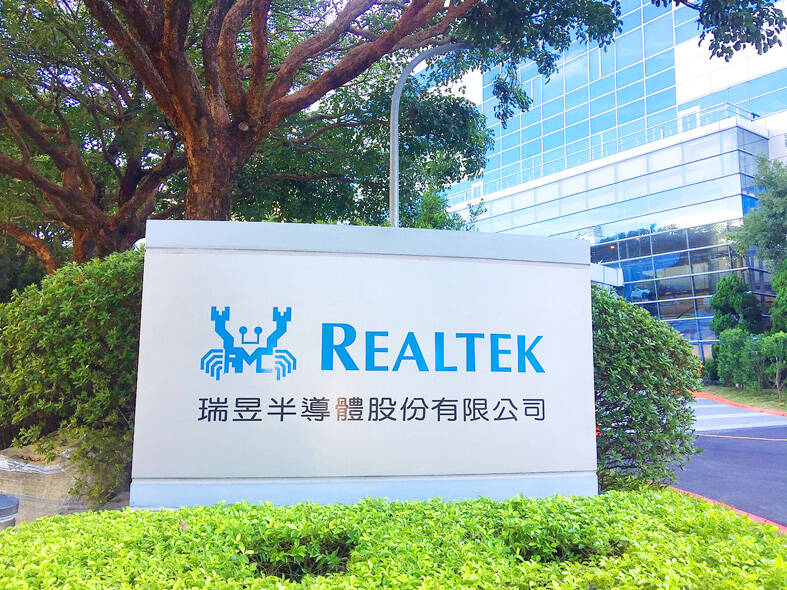Realtek Semiconductor Corp (瑞昱半導體), which designs Wi-Fi and Ethernet chips, yesterday reported its lowest quarterly net profit in three years after inventory corrections dampened chip demand, but it is seeing a budding recovery in the PC and TV segments that should help it regain revenue growth.
Realtek said it had received rush orders for chips used in PCs, TVs and other consumer electronics during the three-month period to last month.
The momentum is to extend into this quarter, as customers start to replenish inventories, which had been reduced to reasonable levels, the company said.

Photo: Grace Hung, Taipei Times
“We believe we have hit the trough of this downcycle. We expect the second quarter will be a better period than the first quarter. The second half of this year will be better than the first half,” Realtek spokesman Huang Yee-wei (黃依瑋) told an online investor conference.
“As the recovery is mostly coming from the PC and consumer electronics segments, it is premature to say the industry is staging an extensive recovery,” Huang said. “However, messages from customers also show that business visibility for the second half remains dim.”
The company is also seeing a slower upgrade of networking technologies compared with previous generations, Huang said.
The recovery would largely hinge on global economic conditions and geopolitical tensions in Europe, he said.
Worldwide PC shipments this year are to contract about 10 percent year-on-year based on the expectations of major contract PC makers, he said.
PC-related products accounted for 29 percent of the company’s total revenue last quarter, while chips used in non-PC applications made up 71 percent.
Realtek’s revenue contracted 9.8 percent quarter-on-quarter and 34 percent year-on-year to NT$19.63 billion (US$641.04 million) last quarter.
Net profit contracted 15.9 percent to NT$1.79 billion during the first quarter, compared with NT$2.13 billion in the fourth quarter last year, the Hsinchu-based chip company said.
On an annual basis, net profit plummeted 65.4 percent from NT$5.19 billion.
Earnings per share dipped to NT$3.5 last quarter from NT$4.16 the previous quarter and NT$10.15 in the first quarter of last year.
Gross margin dropped to 43.1 percent last quarter, from 43.7 percent in the final quarter of last year and from 52.2 percent in the first quarter of last year.
The company attributed the slimmer gross margin to an unfavorable product mix as it shipped more lower-margin TV and consumer electronics chips, as well as inventory valuation losses.
Intensifying price competition also played a crucial part, it said.
All those unfavorable factors are to stay in place this quarter and weigh on gross margin, it added.
Realtek said it cut its inventory by about 17 percent to NT$21.22 billion last quarter, from NT$25.55 billion in the fourth quarter last year.

PROTECTION: The investigation, which takes aim at exporters such as Canada, Germany and Brazil, came days after Trump unveiled tariff hikes on steel and aluminum products US President Donald Trump on Saturday ordered a probe into potential tariffs on lumber imports — a move threatening to stoke trade tensions — while also pushing for a domestic supply boost. Trump signed an executive order instructing US Secretary of Commerce Howard Lutnick to begin an investigation “to determine the effects on the national security of imports of timber, lumber and their derivative products.” The study might result in new tariffs being imposed, which would pile on top of existing levies. The investigation takes aim at exporters like Canada, Germany and Brazil, with White House officials earlier accusing these economies of

EARLY TALKS: Measures under consideration include convincing allies to match US curbs, further restricting exports of AI chips or GPUs, and blocking Chinese investments US President Donald Trump’s administration is sketching out tougher versions of US semiconductor curbs and pressuring key allies to escalate their restrictions on China’s chip industry, an early indication the new US president plans to expand efforts that began under former US president Joe Biden to limit Beijing’s technological prowess. Trump officials recently met with their Japanese and Dutch counterparts about restricting Tokyo Electron Ltd and ASML Holding NV engineers from maintaining semiconductor gear in China, people familiar with the matter said. The aim, which was also a priority for Biden, is to see key allies match China curbs the US

Teleperformance SE, the largest call-center operator in the world, is rolling out an artificial intelligence (AI) system that softens English-speaking Indian workers’ accents in real time in a move the company claims would make them more understandable. The technology, called accent translation, coupled with background noise cancelation, is being deployed in call centers in India, where workers provide customer support to some of Teleperformance’s international clients. The company provides outsourced customer support and content moderation to global companies including Apple Inc, ByteDance Ltd’s (字節跳動) TikTok and Samsung Electronics Co Ltd. “When you have an Indian agent on the line, sometimes it’s hard

‘SACRED MOUNTAIN’: The chipmaker can form joint ventures abroad, except in China, but like other firms, it needs government approval for large investments Taiwan Semiconductor Manufacturing Co (TSMC, 台積電) needs government permission for any overseas joint ventures (JVs), but there are no restrictions on making the most advanced chips overseas other than for China, Minister of Economic Affairs J.W. Kuo (郭智輝) said yesterday. US media have said that TSMC, the world’s largest contract chipmaker and a major supplier to companies such as Apple Inc and Nvidia Corp, has been in talks for a stake in Intel Corp. Neither company has confirmed the talks, but US President Donald Trump has accused Taiwan of taking away the US’ semiconductor business and said he wants the industry back